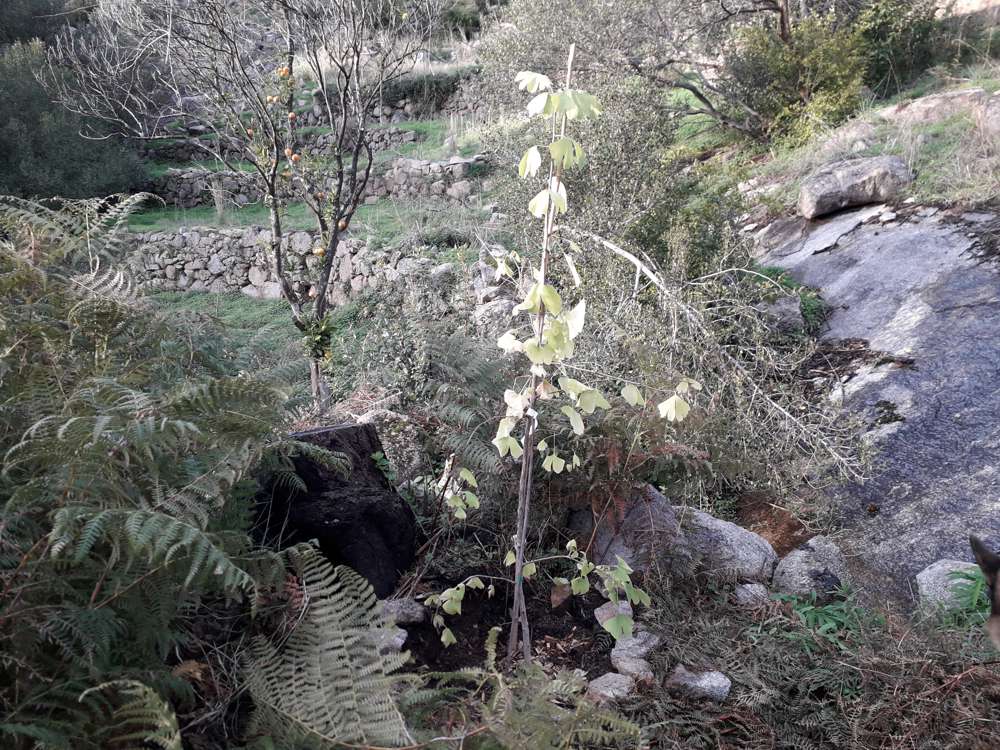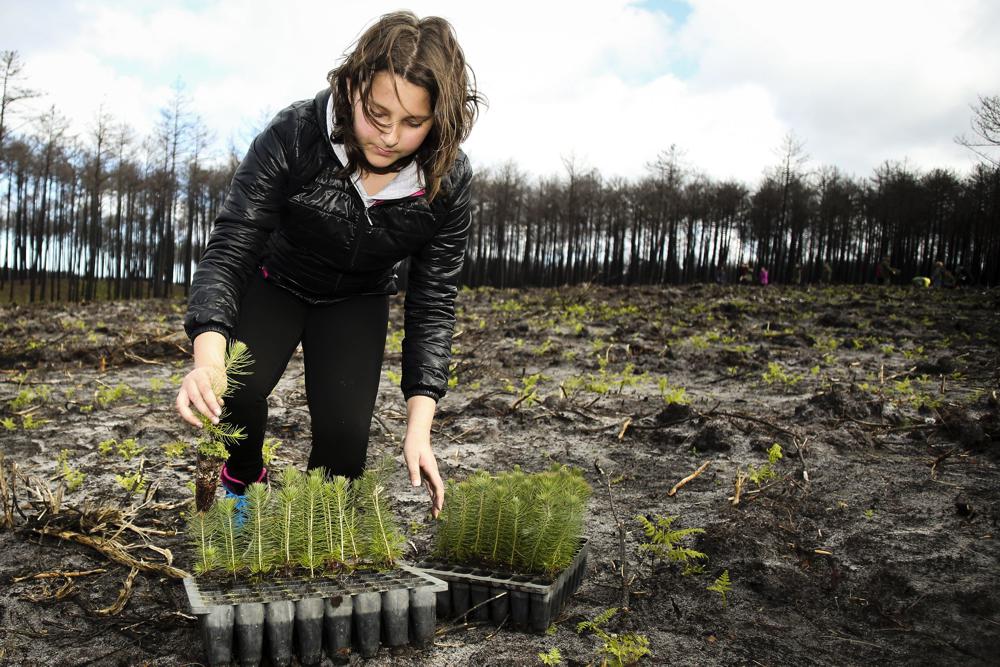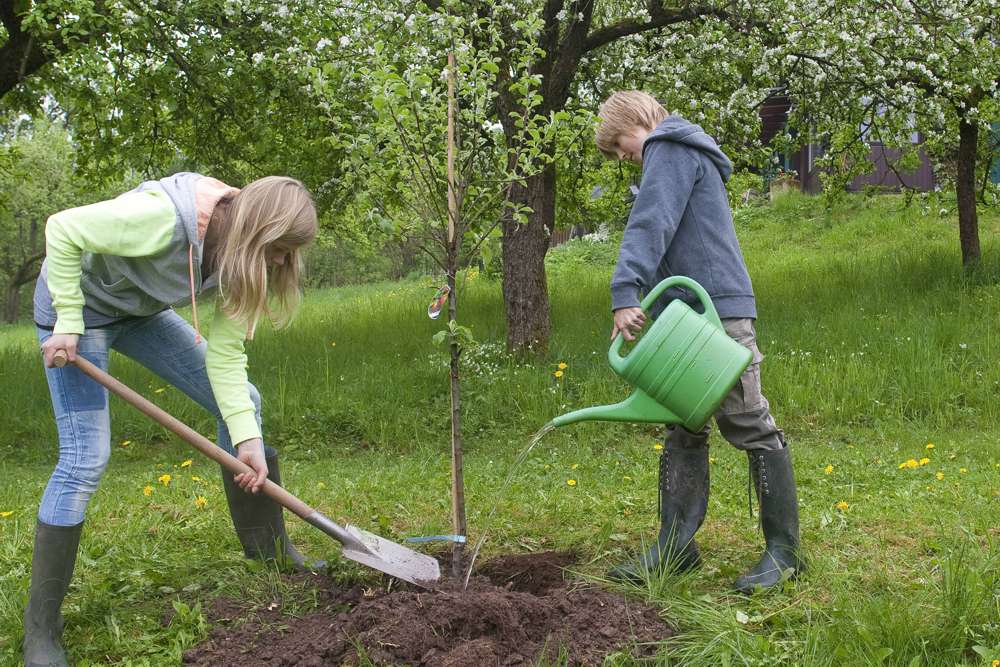Saturday 28th November 2020
The answer is easy. You make friends with a tree by planting it yourself. Choose a species of tree that you like: an oak or an olive tree, an umbrella pine or a fig, a chestnut or an apple tree. The choice is yours, the selection is huge. How do you go about it? Visit a tree nursery and take a look at those little trees…
It’s late November now, the best time to plant a young tree. For this your fingers have to enter into close contact with the earth. Pick up a handful of soil from the place you are intending to plant the tree. Take a close look at the soil, and smell it. Make sure you feel it is good soil. It should be soft, dark and loose. Grab a hoe, a bucket with mulch and a watering can filled with water. At the moment I am planting at least one tree every week. Last Saturday I planted a ginkgo tree. How did that work out? First of all I had a think about where I would plant it and explained my choice to the tree. I talk to my trees from day one, telling them stories. Finding the right spot is the most important decision. Make a cosy nest for your best friend, it needs good-quality soil, plenty of water in the summer, little in winter. As for ginkgo trees, they like a place that offers protection from the wind; also it likes to have other trees around, friends it will learn to communicate with. For the most important part of a tree is not visible. The most important part lies underground.
The most difficult phase in raising a tree is its infancy. Here in the south of Portugal between May to October it does not rain. This means your friend the tree has to (a) survive six months of absolute drought, unless you are able to water it for a long period of time with at least ten litres a day, during the months of July through October, during the hottest and driest time of the year. But be careful to only water it in the evening just before sunset. This way it will have enough time during the night to drink the water without losing it again to the sun straight away. Add to that (b), the fact that summer is the time here where the sun shines for longer and with more intensity than in the winter. Build a roof shade for your tree to provide your young tree with shade on the southwest-facing side in the hottest period of the day, between 2 and 6pm. It will thank you for it and grow. If you have a good sense of scent you will smell your tree. It will be happy when it feels your presence, and dedicate a scent to you. For the construction of a roof shade use materials that may be naturally recycled at any time: four to six wooden sticks made of sustainable bamboo or reed, sisal yarn and cork. If the tree is well it will show you. A few years ago I planted an apricot tree. Every year, on the 10th of June it gifts me fruit, not a day later, rarely earlier; in even years there are more apricots, in uneven years fewer.
Bear in mind that if you adopt a tree you are the frontline carer and always there for it – at least during the first five years. By that time it should have driven its roots deep enough into the soil to be able to access the all-important water even in late summer. This first period is very important. You mustn’t skip a day, doing so could scupper your work of several months, or years even in a single day. Young trees need support when they are growing.
When you plant a tree you take on responsibility. You learn to observe, to become attentive and mindful, and to make sure your tree is truly healthy and happy. If it’s not doing so well you will notice very quickly, and need to find out what you can do to help it get better. Trees, just like people or animals, may become ill. Plant your tree where it can enjoy some peace and quiet, as well as plenty of space. Think ahead of what it will look like in 30 years’ time, how tall, how strong it will be and how much space it will occupy. Plant it on a spot where it’s unlikely it’ll be felled again right away because it is standing in the way of a human. Ask friends, talk to people you know neighbours whether they might like to plant a tree with you, whether they have space in their garden – or even a plot of land in a forest where you can accommodate your future friend. Bear in mind that trees love to stay put in one place their whole life. They don’t travel, and if they have to, they really don’t enjoy it. They don’t appreciate being replanted. There is a reason behind the popular saying you don’t uproot an old tree.
PS: Planting trees and reforestation continue to count amongst the best strategies for stemming climate change. Forests store millions of tons of carbon dioxide, in exchange producing the oxygen we need to breathe. This goes to show that the global planting of trees is one of the most effective solutions for lowering the level of CO2 in the atmosphere. All findings within plant science support this opportunity to slow the speed of climate change through global reforestation with mixed forests, but also the need for urgent action. If every person planted just a single tree every year, emissions would decrease by an average 25 kg of carbon dioxide per tree and per person. Basically, the natural solution of our climate issue resides in the forest. Visit us in Caldas de Monchique, in southern Portugal, where ECO123 over the period between 2020 and 2030 is creating its Botanic Forest Garden, planting 1 001 different tree species. Support the forest on the ground. Plant your own tree and/or sponsor one.
 Eco123 Revista da Economia e Ecologia
Eco123 Revista da Economia e Ecologia





